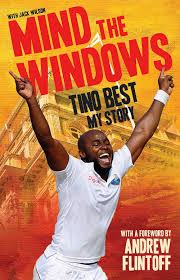Mind the Windows
Martin Chandler |Published: 2016
Pages: 240
Author: Best, Tino
Publisher: John Blake
Rating: 3.5 stars

Fast bowlers are one of the game’s great attractions, and over the years the Caribbean islands have produced some of the greatest of them. With all due respect to Tino Best his name does not resonate in the same way as some of his predecessors, but he was undoubtedly quick and, as this autobiography confirms, quite a character.
It may just be a sign of age, but the press release that accompanied Mind the Windows, and the striking colours of the book’s dust jacket, did give me some cause for concern. Scholarly was clearly not going to be the word to describe its contents and, if I was going to use adjectives beginning with ‘s’, the more likely were going to be sensationalist and salacious.
Having now read Mind the Windows I have to say that some of the language used is rather too course for my tastes, and some of the details of Best’s sex life information that I neither wanted nor needed to know. That said Best is clearly a man who wears his heart on his sleeve so I will not judge him so harshly on some of the more ‘over the top’ references that crop up at regular intervals in his story as I otherwise might.
Despite those misgivings there is much of interest in Mind the Windows. Best is the first of his generation of West Indians to go into print, which helps, but he also approaches his task rather differently to other West Indian cricketers whose autobiographies I have read. He dwells at some length on the Caribbean way of life and describes with commendable honesty the attitudes of a man who is a good enough player to make a living from cricket, but lacks the superstar status that would mean money was no longer a cause for concern for him. He tells of his time in the ICL, of his trials and tribulations with some coaches, opponents and teammates, as well as his much more positive relationships with others.
Even if he goes a little too far at times Best is refreshingly candid about his private life. His love for pretty ladies is a given, as is his enormous respect and admiration for the matriarchal figures in his family, as well as his great uncle, 1980s Test batsman Carlisle Best. He is severely critical of his father, currently in prison and clearly a constant source of disappointment to him, but readily tells how his dreams for change and a normal father and son relationship remain undimmed.
Best on sledging is entertaining, as is Best on the opposition. He has little bad to say about any of the game’s biggest names, but is rather less complimentary about the lesser lights. The incident with Andrew Flintoff that gives his book its title is, inevitably, told with some relish as well as some lesser known tales of the banter that goes on in dressing rooms and on the field.
Towards the end of the book is a chapter on the Mumbai Test of 2013/14, Sachin Tendulkar’s last. In the record books the match was a routine win for the home side, but the atmosphere in the packed ground understandably emotionally charged. Best’s ghost, journalist Justin Wilson, has done an excellent job of communicating Best’s thoughts and feelings on that game and on the subjects of Tendulkar and India more generally, and for this reviewer that was the highlight of the book.
One slight frustration is the timing of the release of Mind the Windows. Had it gone to press a few weeks later, after West Indies’ twin triumphs in the mens’ and women’s World T20s, then Best’s closing chapter might, for having that additional evidence, have been more satisfying. He does, as he can hardly avoid doing, express his views on the problems that face West Indian cricket, but it is a slightly disappointing end. There are some interesting and novel points raised some of which are certainly worthy of more detailed treatment than Best gives them here.
I was particularly struck by one suggestion. It seems that inter-island rivalries are as intractable as ever, and Best suggests that the West Indies could be wound up and henceforth the individual island nations play on their own. There was a time in my youth when that was mooted as a possible way of diluting the Caribbean talent pool sufficiently to enable the other Test nations to compete with the men in maroon. It seems absurd at first blush to suggest it now when the Test side is so weak, but on reflection Best says enough to kick start a debate.
For inflexible bluff traditionalists the tabloid style writing of Mind the Windows will mean it is not a book they enjoy at all. For the younger generation however, or the sort of bluff traditionalist who, to use a phrase Tino would approve of, does from time to time take his head out of his own arse, it is an entertaining romp through the modern game.






Leave a comment